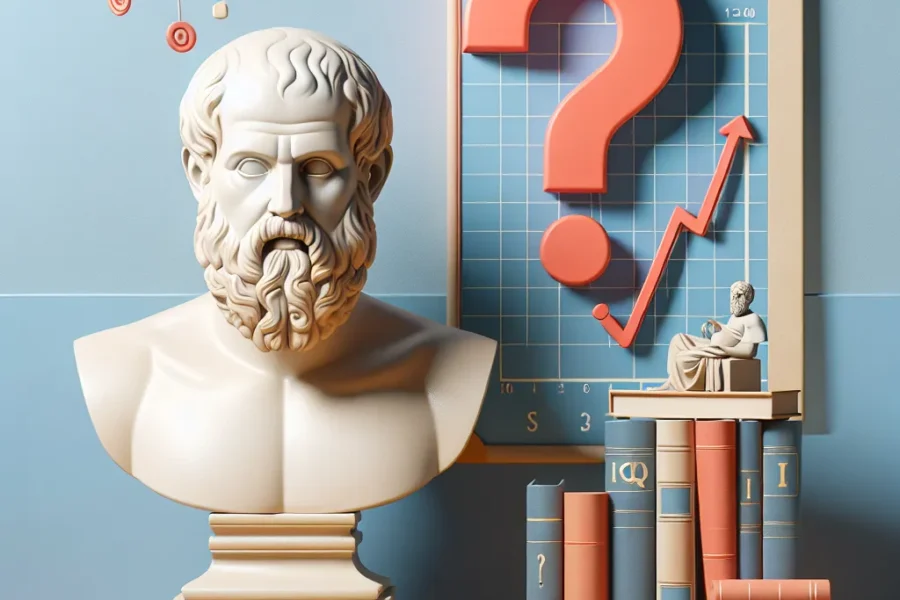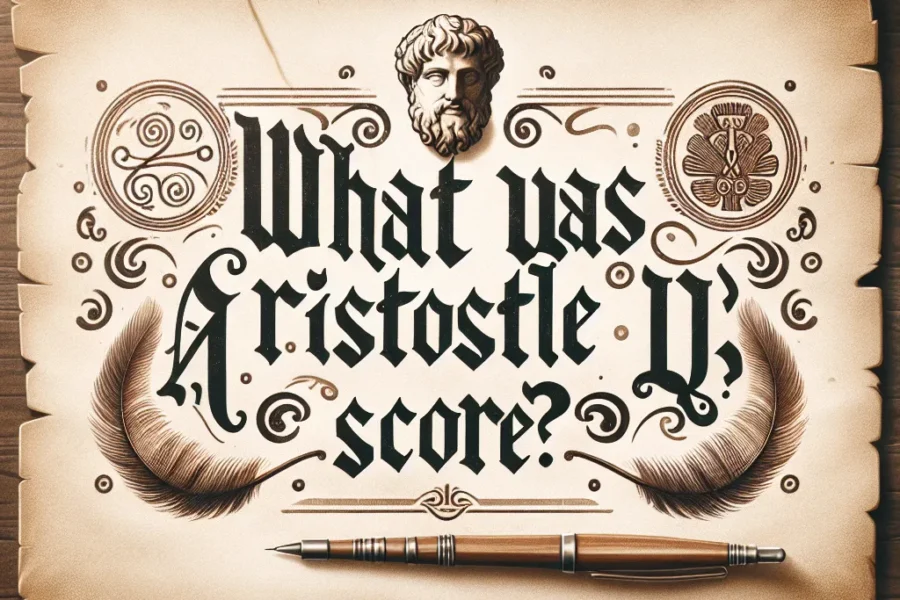If you are fascinated by the intriguing world of ancient philosophers, you may have found yourself pondering, “What was Plato’s IQ score?” It is a question shrouded in mystery and speculation, often captivating the minds of those who seek to measure the intellect of history’s most profound thinkers. In this blog post, we delve deeply into the enigmatic concept of Plato’s intelligence, exploring whether it’s even possible to quantify the mental capacity of someone like him with a modern-day IQ score.
If you are looking for legitimate IQ Tests which pass the entry bar for Mensa, see our IQ Tests.
### Introduction to Plato’s Intellectual Legacy
Plato, born in Athens around 428/427 BCE, was a disciple of Socrates and the teacher of Aristotle. His contributions to philosophy, political theory, and education cannot be overstated. From the dialogues in “The Republic” to his theories of forms, Plato laid much of the groundwork for Western philosophical thought. His works have survived millennia, continuously inspiring scholars, students, and thinkers alike.
### The Impossibility of Direct Comparison
First and foremost, it’s crucial to understand why it’s problematic to assign an IQ score to an individual from ancient history. IQ tests are modern constructs designed to measure human intelligence through a standardized method comprising various tasks. These assessments have evolved through extensive research, primarily in the 20th and 21st centuries, and they reflect contemporary understandings of cognitive abilities.
Plato lived over two millennia ago, in an era entirely different from our own in terms of education, societal norms, and intellectual paradigms. The skills and kinds of intelligence valued in his time were different, and thus it’s not just difficult but also somewhat inappropriate to compare his intellect using today’s metrics.
### The Nature of Plato’s Intelligence
While we may not be able to assign an exact IQ score to Plato, we can consider the nature of his intelligence through his body of work.
#### Logical and Analytical Intelligence
Plato’s dialogues often feature Socratic questioning—a method of inquiry aimed at stimulating critical thinking. This indicates a high level of logical and analytical intelligence. In “The Republic,” for instance, Plato explores justice, governance, and the nature of the human soul through a series of logical arguments.
#### Abstract and Theoretical Intelligence
Plato was a thinker ahead of his time, often delving into abstract theory. His Theory of Forms postulates that non-material abstract forms possess the highest and most fundamental kind of reality. This level of abstract thinking suggests a mind adept at handling complex, theoretical concepts.
#### Philosophical Intelligence
Plato’s philosophical musings were far-reaching. He ventured into metaphysics, epistemology, ethics, and political philosophy. His works imply a profound understanding of human nature and the universe—a hallmark of exceptional philosophical intelligence.
### Historical Context and Education
In Plato’s time, education was primarily a privilege of the affluent. As a member of a wealthy and influential family, Plato had access to one of the best educations in ancient Greece. He studied under Socrates, who is often considered one of the founding figures of Western philosophy. Plato’s aristocratic background gave him the opportunity to engage with the leading intellectuals and political figures of his time.
This context is crucial when considering Plato’s intelligence. His insightful works and sophisticated ideas did not arise in a vacuum; they were the product of a conducive environment rich in intellectual stimulation.
### Modern Interpretations and Speculations
Despite the inherent challenges, numerous people have speculated on what Plato’s IQ might be if assessed by modern standards. Some argue that his ability to produce extensive, thought-provoking dialogues implies an IQ well above the average range, potentially between 150 and 180. These estimations, however, remain speculative and should be taken with caution.
#### The Flynn Effect and Historical Comparisons
When discussing historical figures and their potential IQ scores, it’s worth considering the Flynn Effect, which observes that average IQ scores have increased over time due to improved education, nutrition, and environmental complexities. Consequently, even if we could derive an IQ score for Plato, it would be challenging to compare it meaningfully to modern IQ scores without significant adjustments.
### Plato’s Enduring Influence
Plato’s influence extends far beyond what a single number could encapsulate. His work laid the cornerstone for much of Western intellectual thought. For instance, his contributions to epistemology explore the nature and scope of knowledge, a topic that remains relevant in contemporary discussions in both philosophy and cognitive science. “The Allegory of the Cave,” one of his most famous works, continues to be a poignant metaphor for human perception and enlightenment.
Furthermore, Plato founded the Academy in Athens, one of the earliest institutions of higher learning in the Western world. His emphasis on reason and inquiry as the path to knowledge inspired generations of philosophers and scientists.
### Conclusion
While it is intriguing to ponder what Plato’s IQ score might have been, it is ultimately an unanswerable question due to the vast gulf of time, cultural differences, and the nature of intelligence itself. Plato’s intellect is better appreciated through his enduring contributions to philosophy, political theory, and education.
Rather than focusing on an elusive number, appreciating Plato’s intellectual brilliance involves examining his extensive body of work and the profound impact he has had on subsequent generations. The countless discussions, critiques, and theorizations his works have sparked testify to a mind of extraordinary capability—a testament that no standardized test could ever fully encapsulate.
If you are looking for legitimate IQ Tests which pass the entry bar for Mensa, see our IQ Tests.
In the final analysis, the true measure of Plato’s intelligence lies not in a hypothetical IQ score but in the rich and lasting legacy he left to humanity. Whether you are a philosopher, a student, or simply a curious individual, contemplating Plato’s works and ideas continues to offer invaluable insights and inspirations.
Inquirer and seeker, ponder not the number but the mind behind the dialogues. The depth, complexity, and wisdom embedded in them reflect an intellectual brilliance that transcends the bounds of any test, ancient or modern.



Leave a Comment